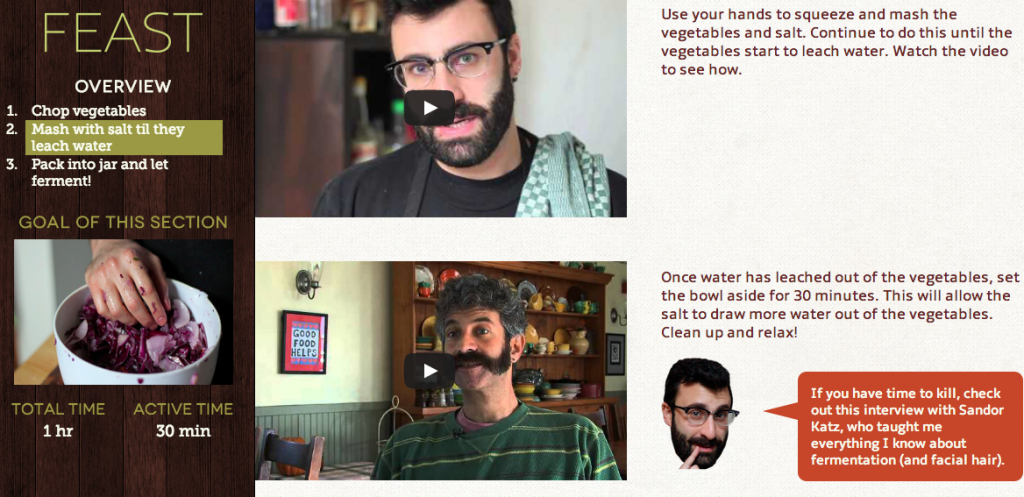As the demand for online education grows, Feast, “the online cooking school for the common man,” is betting that the future of cooking education is online. The San Francisco-based food startup, which is currently participating in 500 Startups’ sixth incubator class, is applying a Lynda or Skillshare-like e-learning model to help make cooking education more affordable, convenient and hands-on. The team definitely has their work cut out for them, though. With innumerable cooking websites, the omnipresent Food Network, and popular TV cooking shows launching their own online programs, cooking content has become increasingly difficult to monetize, especially for newcomers without a well established brand.
HOW IT WORKS
Feast’s interactive, skill-focused classes make it easy for people to learn fundamental cooking techniques at home. Students follow a lesson in real time and are able to interact with both their teacher and other students for support and feedback. “The Food Network creates separation between people and their kitchens and cultivates a fear of failure,” says Feast co-founder David Spinks. Feast, he says, aims to “help people get over intimidation factors and feel comfortable experimenting, becoming more confident and capable home cooks.”
WHO’S BEHIND IT
Co-founders David Spinks and Nadia Eghbal may have no culinary training, but they do possess extensive online community building experience, hence Feast’s emphasis on social. Spinks previously created The Community Manager and consulted for online learning startup Udemy. Eghbal co-produced The Startup Product Summit and worked for Newsbound and GreatSchools. Their combined experience in developing active, engaged online communities could help set Feast apart from other popular online cooking education sites like Cook Taste Eat, founded by Michelin-starred chef Michael Mina. Feast’s sole instructor, Chef and Co-founder, Jeremy Umansky is a CIA graduate who previously worked for Whole Foods and Fairway Market and is currently the Sous Chef of Brooklyn Fish Camp.
Though the online cooking space is crowded, Spinks thinks there’s a big market opportunity. He estimates that cooking education is a $1 billion market based on the amount spent on food related experiences and the amount spent on in-person cooking classes, though he is not certain on the number of people currently paying for online cooking content.
THE BUSINESS MODEL
In the beginning, Feast offered $60 class packages that spanned over four weeks and covered a wide range of techniques from kitchen basics to braising. But the team realized that people craved immediate access to entire lessons– they wanted to prepare a feast from soup to nuts in one session. So they revamped their product to better cater to their community, and as of two weeks ago they now offer 6 one-off classes for $10 each on topics like Stockmaking and Indoor Grilling. Modeled after the curated educational experience of Lynda, Feast’s classes include a step-by-step guide with how-to video nuggets that let you cook and learn at your own pace. If Kimchi strikes your fancy you can take the mini class for free and turn your kitchen into a fermentation station immediately, save the class for later, or send it to a friend who’s pickling forays have been subpar.
To further differentiate Feast from others in the online cooking world, Spinks hopes to grow the site into a marketplace for local cooking teachers, a curated database where all videos and content are packaged using Feast’s easy-to-follow style. So for that amazing cooking teacher down the street who doesn’t quite have a knack for design or UX, Feast may one day offer a ticket to online success. But for now, they will focus on perfecting the platform with their one charismatic instructor. Through curated, easy-to-follow content and an engaged online community Feast hopes to float in the over saturated online cooking space and build a loyal community of empowered, confident Feast-ers.




![Feast’s Lessons Learned in Online Cooking Education [Video]](https://foodtechconnect.com/wp-content/uploads/2013/11/Screen-shot-2013-11-20-at-12.01.19-PM-200x200.png)

